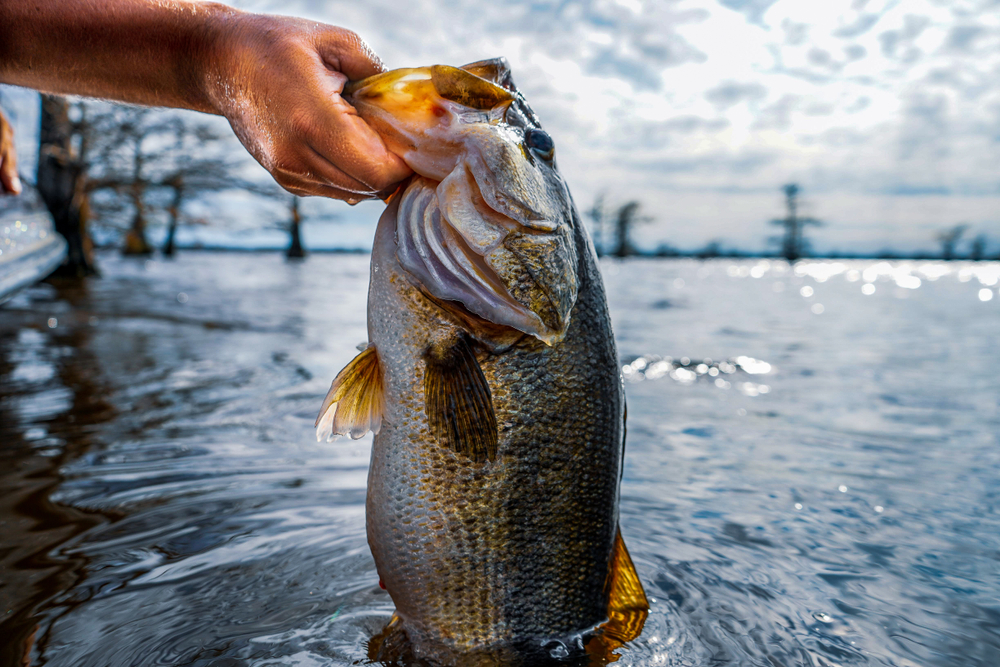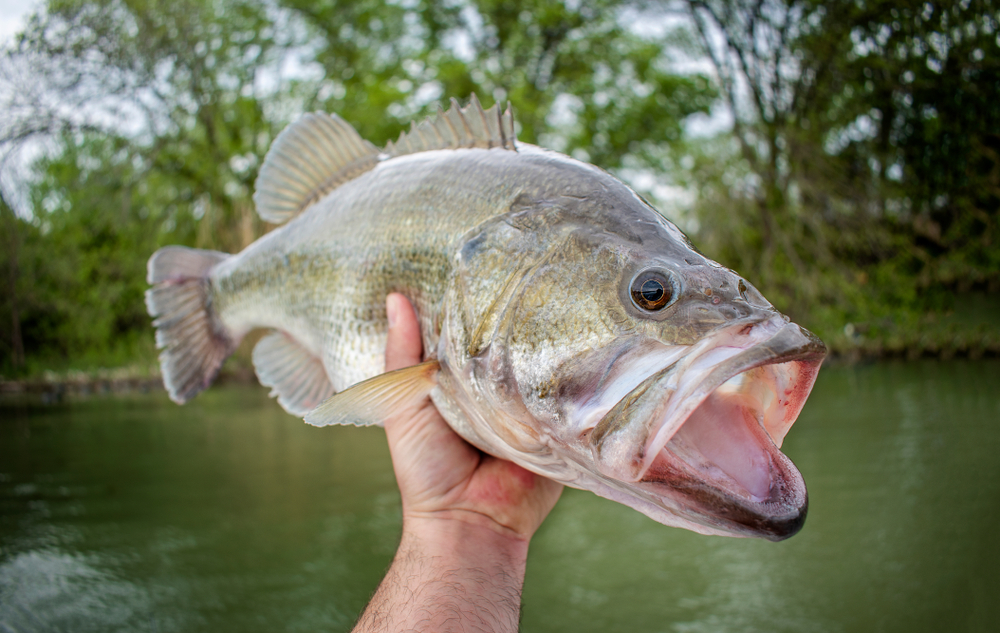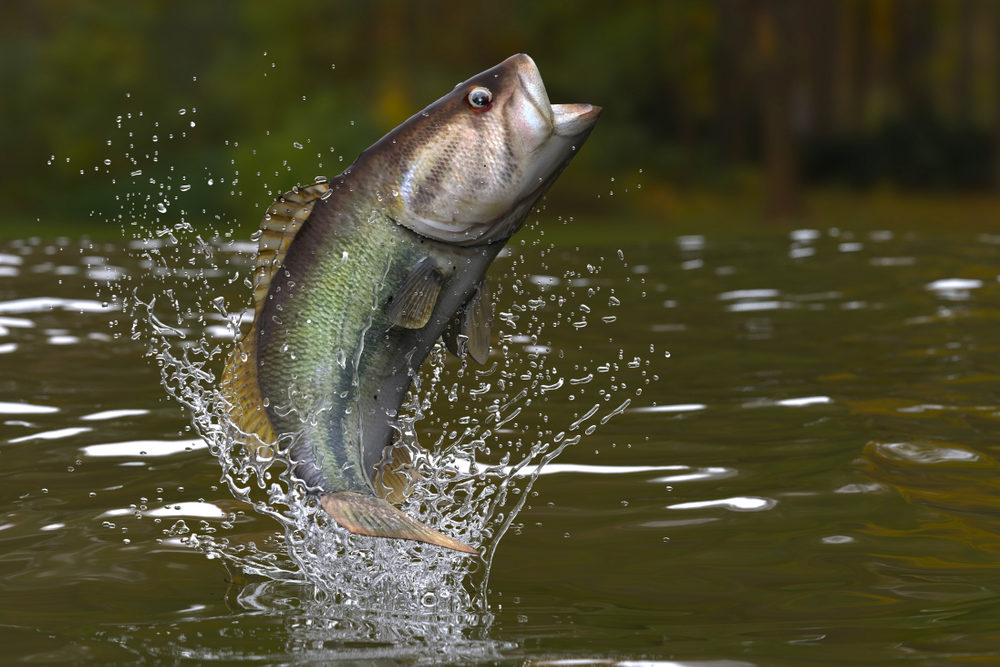Bass, smallmouth, and largemouth are some of America’s number one freshwater fish for game.
But there is plenty of confusion that still lays between the two. You could be a beginner or a pro and still suffer confusion as to which is which.
Being above the water and unable to see them 100% clearly due to ripples as you cast your line, can make it even more troublesome.
It not uncommon if you’re a beginner to even necessarily recognize the existence of the two different species of bass that your local freshwater site has to offer.
There are a few key differences that will help you start to recognize which is which. Knowing the difference between the two is not only good for knowing what you’ve caught but also what you want to fish for.
Find out if one is better than the other to aim for when you’re starting up fishing and how to best fish for each one.
Let’s take you through the ripples and get some answers.

Identification Problems
First of all, let’s have a look at how you would start going about identifying their subtle differences.
Bass fishing is a massive industry and if you are really stuck, there are so many places you can seek out to learn tricks and tips to help you streamline your vision to smallmouth or largemouth specifically and help you tell the difference.
However, their appearance makes it a bit difficult to tell them apart and even special gear and strategies may not prove to be faultless when angling for one of these two beauties.
It is worth knowing that they have other names as well, smallmouth is often also referred to ask ‘Brown Bass’, whereas largemouth bass is sometimes nicknamed as ‘Green Bass’. You may think this will help. It won’t.
The shades that make them green or brown, are very very similar and so when peering into the water, they may appear to look the same still.
However, there are other ways to get around this problem and if you’re ready to be a sharpshooter with your line casting and a bit of a detail hunter when checking out your target, you will get past this problem.
Habitats
One of the main differences these two fish present is their preference in habitat.
They both enjoy certain conditions and so it is imperative to pay close attention to the specific habitats that you fish in, should you want to reel in your perfect catch.
Smallmouth Bass/ Brown Bass
Seeking out smallmouth bass, you should seek high clarity waters.
These fish tend to live in waters that are much clearer than their counterparts- the largemouth bass. They prefer clear water streams, lakes, rivers and sometimes reservoirs too.
They tend to enjoy these areas equipped with a rocky area, perhaps small rockpool type areas and sandy bottoms.
These fish also seek out cooler temperatures in their water, they have more resistance to sustaining low temperatures.
Smallmouth is also pollution intolerant, so should you see many smallmouth bass in one body of water you know it is healthy, and vice versa, if you are aware that an area is heavily polluted then it is probably unlikely you will do well fishing for smallmouth there.
Smallmouth also enjoys a stronger current than their counterparts. You are more likely to find these in fast-moving rivers.
These are considered river fish, which are more likely to have a torpedo-shaped body, whereas lake fish are more likely to have an oval-shaped body.
Largemouth Bass/ Green Bass
The largemouth bass is much easier to find than the smallmouth bass.
They inhabit a much wider range of habitats and can be found pretty much anywhere in the USA where there is a body of water large enough.
They will be found in ponds, reservoirs, swamps, pools, lakes and any other still body of water you can think of.
They are much more into warmer waters than their river-dwelling counterparts and very much enjoy thick vegetation.
So, while you may be able to see smallmouth bass clearer through more translucent waters, you will be able to guess the presence of largemouth by seeing heavy vegetation in the waters.
Feeding Habits
While it is not like you are going to be feeding these fish like a pet, it is important to know their favorite foods so that you can present the appropriate lure to them to easily tempt them in.
Smallmouth Bass/ Brown Bass
While their diets do not vary, smallmouth hunt for their food in a different way to largemouth. Smallmouth bass is a little more open with their existence than largemouth is in general.
You will find that smallmouth bass does not rely on cover when feeding, or at all.
Though they essentially feed on the same prey as their counterparts they are not quite as sneaky or as shy. This type of bass will leave cover to live in open waters and travel far with no cover.
Hence, they also feed like this often as well, and it is most true in the summer months when schools of baitfish inhabit the deep open waters as temperatures will rise in the waters.
Largemouth Bass/ Green Bass
Regardless of what they’re doing largemouth bass like the cover, feeding, or otherwise. This makes them a particularly easy target as they’re very predictable.
They use their cover to live and to ambush their food, their green-tinted scales make sense here as it helps them camouflage against the waterbed vegetation so they can sneak up on their food and strike from a close range.

Anatomy
Seeking out the anatomy of these fish is very helpful, especially if you see bass in a stream or a lake during the months before the water gets too hot, and it’s harder to tell if it is smallmouth or largemouth.
Here are a few things to look over to help you figure out what fish you are looking at.
Size
More difficult to tell when they’re young but as they grow, these two differ in size. Largemouth has the advantage, as they grow larger than smallmouth does.
Smallmouth tends to stay at or below 8lbs, whereas largemouth stays at or below 12lbs, there may be the odd exceptions in certain habitats, especially very lush and lively ecosystems.
Largemouth also has a largemouth. This is to catch and swallow food with greater ease, so their larger size is not exactly surprising.
They also dominate the ecosystem as they have an advantage meaning they can outdo other fish for their food sources.
Since many smallmouths also live in waters with a current their size tends to stay a little more on the streamlined side.
This does not mean they are not as well-equipped as feeders but it does mean that they are smaller to make for better ease in traveling these types of currents.
Mouth
It probably seems rather obvious to state that their mouths differ since it is in their names.
It is one of the best ways to tell them apart. Take your focus on how their mouth fits in relation to their other features.
The largemouth’s upper jaws reach past its eye, whereas the smallmouths just fall short of its eye. This is easiest to check once you have reeled your fish in.
Fins
If you are feeling ambitious you can check by looking at the dorsal fin as well, although it is not always as obvious as the other methods.
The largemouth tends to have a gap that separates the fin, whereas the smallmouth does not. This break is usually around halfway across down the fin.
Colors
Sometimes you can use color as an indicator, as we know that the largemouth is nicknamed ‘green bass’ and the smallmouth is nicknamed ‘brown bass’.
Though these colors can seem similar and are not always consistent as it can depend on the age of the fish, the environment around it, and other things.
It is not always best to rely on this technique of identification.
Scales
Another tactic of identification that is a little more reliable than color, is the markings of a bass’ scales. largemouth have dark horizontal lines that look somewhat spotty.
Smallmouth on the other hand has straight vertical lines. This is not foolproof or always a solid way to identify but it is useful and can be a key way to identify in most cases.
Common Lures
Both types of freshwater bass can be caught with the same lures as they tend to have the same diet.
While differences in lures are not grand, some anglers may choose to use different kits and lures for each species. Let’s see what they recommend works best.
Smallmouth Bass/ Brown Bass
A lot of anglers prefer using fishing jigs for smallmouth bass, they work rather well at depth and tend to work well over rock and gravel too, which is a great feature to have when infiltrating this species preferred ecosystem.
You can also use spoons, as they work great when jig and flutter them to s8imulate a wounded baitfish.
Don’t cast aside other lures that can work with largemouth too, such as skirted jigs, spinners, and topwater baits, as these can work well on smallmouth bass as well.
Largemouth Bass/ Green Bass
A majority of largemouth bass fishers enjoy a skirted jig with Texas-rigged plastics for catching largemouth bass.
However, you will want to learn how to catch bass with plastics before you try out this method if you haven’t already.
These are weedless and snagless, so can go through some heavy cover to find where a largemouth would usually hide to stalk its prey.
This is critical for largemouth bass fishing due to their habitat, you don’t want to get your bait all caught up in underwater plants and scare off the fish trying to get it loose.

Bass Distribution
Smallmouth Bass/ Brown Bass
This type of bass is less distributed than its counterparts. Being native to the upper regions of Mississippi, the St.Lawrence River, and the Great Lakes regions.
They can also be found throughout the northern regions of the USA and Canada too.
They may be found further south in places such as reservoirs as their numbers have increased in the southern regions in recent years.
Largemouth Bass/ Green Bass
More well distributed you will find them in almost every body of water big enough to hold them.
They can be found in every US state as well as regions of Mexico and southern regions of Canada, They can also be found in Europe, Central America, and Japan.
In some places, they are becoming invasive as a species and have been blamed for the extinction of some bird species.
If you want to find a fish that is big in numbers and found everywhere to give you a better chance as a beginner, largemouth bass is a good fish to start with.
When to Fish for Them
Smallmouth Bass/ Brown Bass
This species decimates all the rules their larger counterparts put in place.
By sticking to the shallows in spring when they spawn and heading into deeper waters in the summer, due to their dislike of hot waters.
They can be very difficult to find in the summer months. But they head back to shallow areas in autumn.
When fishing for smallmouth bass, your best bet is to do so in the spring or autumn, when the waters are calm and the sky is bright, making it easier to spot these fish in the shallows.
Largemouth Bass/ Green Bass
These fish are not so picky and stay in the same areas pretty much year-round as they have a singular preferred habitat and are not bothered by warm waters.
Which is better?
Neither species beats the other as they both have their selling points or quirks that make them a great catch for avid anglers of all levels of expertise.
Some may prefer the size and hunt in the underwater forest for largemouth bass.
Whereas other enough the acrobatic talents and feistiness of the smallmouth bass. They both have their talents and both can pose a challenge in different areas.
It is up to you to decide which you prefer.
To Conclude
These two fish are like long lost cousins who decided to go different ways with their lives.
They share many similarities in their appearance, diet, behavior, and difficulty to catch.
They differ in slight appearances and size and have taken on different habitats and lifestyles.
Some who eat their catch may say that smallmouths taste better whereas largemouth doesn’t have the flavor that smallmouth does.
There is no clear winner between these two fish as they both have their quirks. I suppose the real question is, what do you want to test yourself in?
Agility and fighting willpower against the smallmouth or strength and detection against the largemouth. It’s all up to you.
- 10 Best Trolling Motor Batteries: Top AGM and Flooded Options - January 27, 2021
- Types of Fishing Lures - January 22, 2021
- 8 Best Batteries For Fish Finders - January 22, 2021
